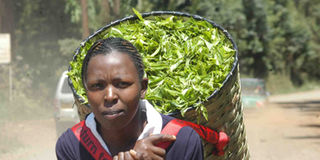Declining tea and coffee export prices set off alarm bells

PHOTO | FILE A tea grower delivers tea to a buying centre near Chinga tea factory in Othaya on January 17, 2011 Tea and coffee prices have been declining in the last few years, hitting a new low and setting off warning bells over the future of the two commodities that are the livelihood of about 3 million Kenyans.
What you need to know:
- Experts say the trend is likely to continue into this year if conditions on the international market remain the same, or even worsen. The prices of the two commodities are susceptible to price volatility in the international market.
- Oversupply in the last 10 months depressed international prices, resulting in lower farmers earnings. Earnings for last year are projected to fall below Sh17 billion, down from Sh19 billion earned in 2012, and a further drop from the Sh22 billion earned in 2011.
Tea and coffee prices have been declining in the last few years, hitting a new low and setting off warning bells over the future of the two commodities that are the livelihood of about 3 million Kenyans.
Experts say the trend is likely to continue into this year if conditions on the international market remain the same, or even worsen. The prices of the two commodities are susceptible to price volatility in the international market.
Production levels of the two crops in other countries, the strength of the shilling, and political crises in target markets are expected to influence price movements.
Tea prices dropped by a massive 38.6 per cent between January and October last year, triggering a call by stakeholders for government intervention through a review of levies to cushion farmers’ earnings.
The prices were the lowest in eight years. But sector experts say the prices have begun to stabilise, sparking hope in farmers that there might not be any further drop.
“The prices have started stabilising at the Mombasa tea auction. We expect that they have already hit their lowest level and anticipate no further decline,” said Mr Peter Kamanga.
East African Tea Traders Association (EATTA), which manages the Mombasa Tea Auction, had projected about Sh3 billion on lower export volumes based on a traditional trend in past few years where earnings have been rising.
But the prices declined rapidly on account of increased production from countries in the region and volumes in the international market.
Farmers’ earnings last year reached Sh69 billion from Sh61 billion in 2011, but the price per kilo declined by 10 per cent due to what the Kenya Tea Development Agency described as a depressed global market for the Black CTC teas for which Kenya is known.
“This was driven by high volumes and volatile market dynamics,” KTDA managing director Lerionka Tiampati said in September 2013.
Green tea delivered to factories in the past year stood at 1.1 billion kilos, compared to 907 million kilogrammes over the same period in 2012.
The exchange rates, though stable at a mean rate of about Sh85 (compared with a mean of Sh89 in 2012) to the dollar, also impacted negatively on the total revenues earned. A weak shilling is always a boon to farmers’ earnings.
The political crisis in Egypt that saw the overthrow of President Mohamed Morsy, and the subsequent uncertainty led to a decline in Kenya’s exports to the country. Egypt is among the top three key destinations for Kenya tea exports.
The situation was made worse by the recent political crisis in South Sudan, which is among the fastest-rising destinations for tea exports.
Coffee prices have also experienced a steady drop, recording the lowest prices in the last six years and threatening to stifle growth in the sector that has only recently recovered from the 1990s slump.
The quantity of coffee auctioned at the Nairobi Coffee Exchange dropped by 38 per cent to 2,442.26 metric tonnes in September 2013 from 3,938 metric tonnes in January.
The average price also fell by 16.8 per cent to Sh286.46 per kilogramme compared to Sh344.3 in the same period.
OVERSUPPLY
Oversupply in the last 10 months depressed international prices, resulting in lower farmers earnings. Earnings for last year are projected to fall below Sh17 billion, down from Sh19 billion earned in 2012, and a further drop from the Sh22 billion earned in 2011.
According to the International Coffee Organisation (ICO), prices hit a six-and-half-year low in November last year, with the composite index averaging 100.99 US cents per pound 5.6 per cent lower than that recorded in October.
Experts say market conditions point to a market struggling to gain stability as production outstrips consumption. Countries like Brazil have responded by debt waivers, while Colombia has announced it will continue to provide subsidies to its farmers.
In Vietnam there have been calls for government funds to stock coffee beans to support domestic prices.
“Pricing of coffee at the international market is subject to many factors. However, there are indications that they are likely to stabilise this year,” said Mr Kennedy Gitonga, head of agri-business at the Coffee Research Foundation.
Exports in October amounted to 8.5 million bags, 9.6 per cent lower than October 2012.





